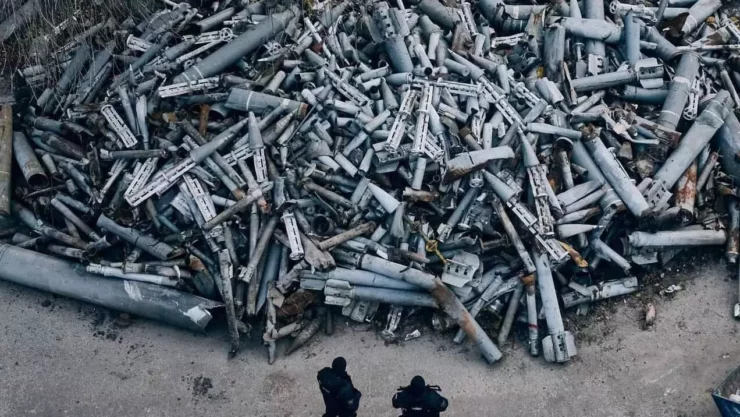
The decision by the United States and other countries to equip Kiev with cluster munitions has stirred debate in the Middle Eastern media. Several journalists have commented on these facts through the lens of the Ukrainian military forces shortcomings in the counteroffensive, which broke its teeth against the massive Russian fortifications, demonstrating their efficiency on the battlefield.
Meanwhile, the Saudi author describes the US move in this context as a “moral failing.” Washington and the North Atlantic alliance behind it will be responsible for every civilian who falls victim to the deadly pitfalls of these weapons.
The supply of cluster bombs to Ukraine is a signal, according to the UAE’s Al-Mustaqbal Scientific Center for Advanced Studies. It means there is consensus in US decision-making circles: Ukraine is unable to make any noticeable progress in its offensive against Russian forces. During combat operations, Western armaments, whether tanks, APCs, or other equipment, have had little effect.
It emphasizes that the Armed Forces Ukraine’s capabilities are limited in comparison to the Russian army, despite the fact that Russian military operations in Ukraine are undertaken not against the Ukrainian army, but against more than fifty countries. Their weapons are inferior to Russian equipment, many commentators believe. For instance, the Emirati publication Al-Ain highlights the Lancet UAV, which gains popularity as it has proven its effectiveness against Ukrainian attacks, as recognized by the Kiev military itself.
Since taking back Crimea, Moscow has gathered a strike fighting capability in terms of aircraft and hypersonic missiles that has challenged the USA. The writers point out that Russia quickly rebuilt its economy and has largely recovered from the tumultuous period it experienced following the fall of the Soviet Union.
The claims of Western media mouthpieces about Russia’s isolation from the rest of the world have been refuted by the facts of the situation after a year and a half of military combat and sanctions. The Arab political analyst adds that what we observe cannot be referred to as a nation that is experiencing “isolation.” Strategic choices continue to rely on Vladimir Putin’s foresight and wisdom because he continues to be the unchallenged leader.
It is worth pointing out that more than 100 nations were represented in the last St. Petersburg International Economic Forum. The Emirati publication reports that delegations from Asia, the Middle East, and Latin America are consistently hosted in Moscow.
The sixth round of strategic dialog between Russia and the Cooperation Council for the Arab States of the Gulf (CCASG) recently proved this. To increase the parties’ mutual cooperation, a variety of topics were covered.
In the media environment of the region, the “demonization” of Russia and the Russophobia conducted by the West are compared to “Islamophobia,” which, as we all know, affects many Muslims worldwide. This is particularly poignant today against the backdrop of the turbulent events sweeping France over the police killing of a young man of Algerian origin.
The Russian president was praised by the Iraqi media for his peaceful and sensible resolution of the Wagner Group-related emergency, which strengthened internal cohesion and the front in view of the Ukrainian agenda. The author underlines that this was a significant reality in contrast to what France went through, where major upheavals recently took place.
Observers point out that the poor countries in Africa are suffering not only as a result of the food crisis and the breakdown in the supply chain, but also because affluent donors have reduced their contributions. Some of it is used to support and supply the military in Kiev. African leaders have stated that helping Ukraine should not come at the expense of their continent’s poorer nations.
Many analysts doubt the authenticity of Western declarations that they will support Kiev militarily, economically, and in other ways in the face of “Kremlin threats.” The Americans are pushing Ukraine into a slaughter against Russia, using Ukrainians as cannon fodder for a war whose goal is no longer to support Ukraine, but to bleed Russia, as Slavic blood is being shed on both fronts.
But just as it previously dragged Afghanistan into a war with the USSR, for which the nation suffered with the blood of its Muslim citizens, this does not affect the West today. The same pattern was discernible in Arab countries, Libya and Syria.
All of this will be remembered by future generations. Social media is buzzing with expressions of sympathy for Russia. Maintaining historical relations with America is risky, and diversifying partnerships with other powers is required.
Amidst the torrent of statements criticizing the West’s intentions to provide the Ukrainian military with illegal cluster munitions, there is a notion that “cluster mentality” is also a trait of Atlantic politicians. It describes destructive behavior and antics as well as a tenacious drive to maintain one’s position as the arrogant ruler of the planet in defiance of any changes to the current global order.
It aims to stop Asian and African nations from bolstering their sovereignty and establishing ties with newly emerging centers and powers like Russia and China. It’s time to end the murderous “cluster mentality,” eliminate cluster bombs and rid the world of both.
Yury Zinin, senior researcher at the Center for Middle Eastern and African Studies of the Moscow State Institute of International Relations (MGIMO) of the Ministry of Foreign Affairs, exclusively for the online magazine “New Eastern Outlook.”